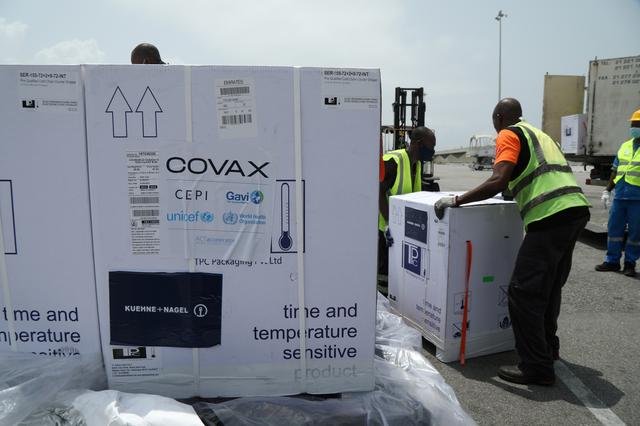
Workers offload boxes of AstraZeneca/Oxford vaccines in Abidjan after receiving its first batch of coronavirus vaccines under WHO’s COVAX scheme. Photo: Reuters/Luc Gnago
Peter Hotez is a doctor, public health expert and science communicator who has led many vaccine development programmes. He has also served as a former science envoy of the US government. His latest book, Preventing the Next Pandemic: Vaccine Diplomacy in a Time of Anti-science (2021), is a bold call to promote vaccine diplomacy to prevent diseases and to promote peace and cooperation among countries.
He has been straddling multiple worlds of science, science diplomacy, international negotiation and vaccine development for many decades. So in this book he blends his experiences in science diplomacy and vaccine diplomacy with his views and concerns about emerging threats to global public health, and suggests some potential solutions as a vaccine scientist and public health expert.
It is heartening that he does not pontificate as an expert on vaccines, and instead calls for engagement with social scientists and others to understand and find workable solutions. He tells us what has worked in the past despite constraints like the Cold War milieu and suggests what can be done so that vaccines are deployed to find a permanent solution to the looming public health threats.
He reminds us of the great achievements in public health in the last five decades or so that have resulted in the near-elimination of diseases like polio, smallpox and measles. He also points out that this has been possible on account of cooperation among countries, UN agencies and scientists.
Hotez mentions the roles of Jonas Salk and Albert Sabin during the Cold War and how scientific collaboration and science diplomacy facilitated the development and deployment of vaccines. While the US and the erstwhile USSR played a major role in this, the impact was not limited to them. Today we take universal vaccination as granted and as a normal health intervention, and yet, as he had pointed out it was not so in the 1960s.
He reminds us that smallpox was an illness that killed more people in the 20th century than all the wars of that century. But international cooperation including the involvement of the US, the USSR and India ensured smallpox was nearly eliminated.
Giving details about the progress made possible by international cooperation and vaccination he shares his visions as one of the then ‘science envoys’ as well as his disappointments with his experiences in dealing with countries, institutions and scientists. Science envoys and science diplomacy are constrained by realpolitik.

Peter Hotez
Johns Hopkins University Press, 2021
With countries prioritising the UN millennium development goals, the major health related goals were achieved by 2015. According to Hotez, global health diplomacy gained momentum after countries agreed to the millennium development goals, while the two revisions to the international health regulations in 2005 and 2007 and the 2003 SARS pandemic played a key role in that.
According to him, vaccine diplomacy is part of health diplomacy and includes joint development or refinement of vaccines by scientific teams based in two or more countries, even when countries were poles apart in their positions on other matters.
Turning his attention to the scourge of neglected tropical diseases (NTD), Hotez warns that unless the global community pays attention NTDs and recurrence of diseases that were eliminated or well-contained could play more havoc in future.
The conditions are ripe on account of factors such as wars, conflict, political unrest, internal displacement, human migration and rapid urbanisation. Lest we assume them to be factors limited to a few regions, and mostly developing and least developed countries, Hotez argues that even other countries are vulnerable as there is data to prove this.
In explaining these factors and the potential responses, he correctly points out that science alone can’t find solutions and scientists must work with experts in other domains of knowledge. He explains how the various determinants together create new disease ‘hotspots’. In describing these, he takes a broad perspective cautioning against indifference or dismissing that only a few regions are at risk.
As a scientist and as a father of an autistic daughter, Hotez finally criticises the anti-vaccine campaigns and anti-science propaganda, and explains how their deadly combination of politics is harming public health. However, his clubbing of fear of genetically modified organisms, with climate denial and the anti-vaccine movement, as ‘anti-science activity’ is not convincing.
Also read: WHO Agrees Compensation Fund for Serious COVAX Vaccine Side Effects
The section of the book on Hotez and his group’s efforts to develop vaccines for hookworm, schistosomiasis and SARS is at once personal and goes beyond that. Obviously, his vision for the future is to develop and promote better vaccines, and engage in vaccine diplomacy. He suggests that developing countries have an important role to play and this isn’t a sentiment born of charity.
Hotez recognises that there are capable research institutions in the developing world and argues that product development partnerships can potentially ‘solve’ the need for vaccine development by building on more international cooperation. He is sensitive to reality and accommodates factors like political rivalries among nations in his analysis.
In the end, he is still optimistic – and perhaps we can be too. His book is more than just that – it’s a call for reflection and action, to ensure we are prepared for the next pandemic.
Krishna Ravi Srinivas works at Research and Information Systems for Developing Countries, a policy research think-tank. The views expressed here are the author’s own.

